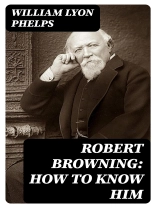In ‘Robert Browning: How to Know Him, ‘ William Lyon Phelps provides an incisive exploration of the complex themes and psychological depth present in the poetry of Robert Browning. Phelps employs a conversational yet analytical literary style, inviting readers to delve into Browning’s intricate character studies and dramatic monologues. Set against the backdrop of 19th-century Victorian literature, Phelps contextualizes Browning’s innovative approach, discussing how his work reflects the tumultuous social and intellectual currents of the time, including the rise of modernism and the questioning of religious norms. Phelps, an esteemed literary critic and professor, had a profound admiration for Browning’s ability to capture the human psyche. His academic background and passion for literature provided him with a rich framework for analyzing Browning’s contributions to literature. Drawing from his own experiences in academia, Phelps aimed to demystify Browning’s poetry for a broader audience, making his insights accessible to both scholars and casual readers alike. This book is an essential read for anyone seeking to appreciate Browning’s genius and understand the nuances of his work. Phelps’s keen observations and engaging prose will enhance your comprehension and enjoyment of Browning’s poetry, making it an invaluable resource for students, educators, and poetry enthusiasts.
Yazar hakkında
William Lyon Phelps (1865–1943) was an eminent American educator, literary critic, and devoted advocate of the joys of reading. Born in New Haven, Connecticut, Phelps earned his B.A. in 1887 and Ph.D. in 1891 from Yale University. During his tenure at Yale, he achieved the rank of Lampson Professor of English Literature and proved to be an inspirational figure in the classroom, passionately instilling the love of literature in generations of students. Phelps was not only a proponent of lifelong learning and reading but was also an engaging speaker and frequent lecturer, thereby extending his educational reach beyond academic walls.
Phelps authored numerous books throughout his career, bringing keen introspection and scholarship to a wide readership. Notable among his works is ‘Robert Browning: How to Know Him’ (1915), which provides an accessible and insightful examination of Browning’s work, offering readers interpretative keys to unlock the essence of the poet’s dense and dramatic literary style. Phelps’s literary style itself is characterized by clarity, enthusiasm, and a compelling conversational tone, making his scholarly work inviting to both casual readers and serious students of literature. As a critic, Phelps is remembered for his sincere appreciation of the moral dimension of literature and his belief in the transformative power of great books.












